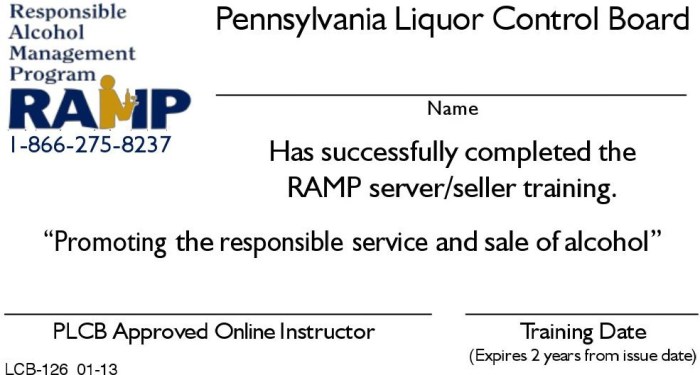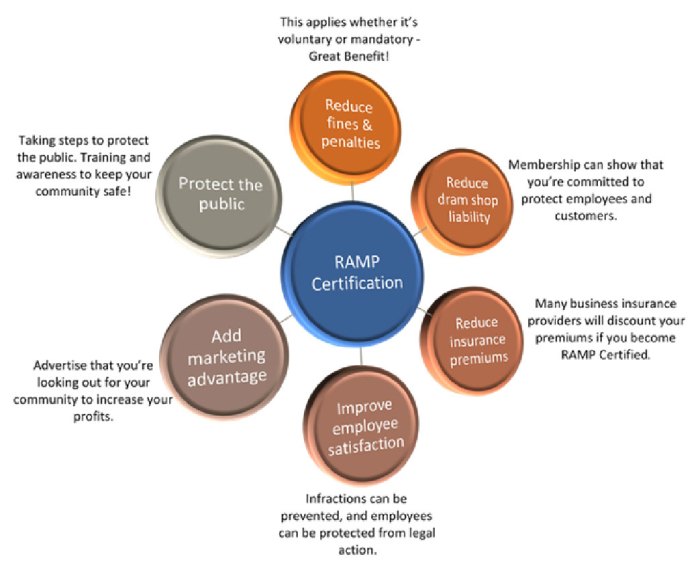Is ramp certification mandatory in pa – Is ramp certification mandatory in Pennsylvania? This article provides a comprehensive overview of the legal requirements, exemptions, certification process, and benefits of ramp certification in the state.
Ramp certification is a requirement for certain businesses in Pennsylvania to ensure the safe and efficient operation of ramps and loading docks. This certification is regulated by the Pennsylvania Department of Labor & Industry (L&I) and is enforced through inspections and penalties for non-compliance.
Ramp Certification Overview

Ramp certification in Pennsylvania is a comprehensive program designed to ensure the safety and efficiency of airport operations. It involves the evaluation and certification of airport personnel who are responsible for the safe and efficient movement of aircraft on and around the airport.
Purpose and Scope
The purpose of ramp certification is to:
- Enhance the safety of airport operations by ensuring that personnel are properly trained and qualified to perform their duties.
- Improve the efficiency of airport operations by streamlining procedures and ensuring that personnel are familiar with the latest safety regulations.
- Comply with federal and state regulations that require airports to have a certified ramp safety program.
History
Ramp certification in Pennsylvania was first established in 1998. The program has been updated several times since then to reflect changes in federal and state regulations, as well as advances in airport safety technology.
Legal Requirements: Is Ramp Certification Mandatory In Pa

Ramp certification is a crucial aspect of workplace safety in Pennsylvania. Businesses operating within the state must adhere to specific legal requirements to ensure compliance and protect their employees.
The Pennsylvania Department of Labor & Industry (DOLI) is the primary regulatory body responsible for enforcing ramp certification regulations. These regulations are Artikeld in the Pennsylvania Code, specifically in Chapter 3263, which governs workplace safety.
Applicability
Ramp certification is mandatory for all businesses in Pennsylvania that utilize ramps as part of their operations. This includes businesses in various industries, such as manufacturing, warehousing, retail, and healthcare.
Specific Laws and Regulations
- Pennsylvania Code, Chapter 3263, Section 3263.151:This regulation requires employers to ensure that all ramps used in their workplaces are properly certified by a qualified inspector.
- Pennsylvania Code, Chapter 3263, Section 3263.152:This regulation specifies the qualifications and responsibilities of ramp inspectors, including their training and certification requirements.
- Pennsylvania Code, Chapter 3263, Section 3263.153:This regulation Artikels the procedures for ramp inspection and certification, including the frequency of inspections and the issuance of certification.
Exemptions and Exceptions
Certain businesses are exempt from ramp certification requirements in Pennsylvania. These exemptions include:
- Businesses that only load or unload cargo from aircraft with a maximum gross takeoff weight of less than 12,500 pounds.
- Businesses that only load or unload cargo from aircraft that are not used for commercial purposes.
- Businesses that only load or unload cargo from aircraft that are operated by the United States government.
Businesses that meet the criteria for an exemption or exception must still comply with all other applicable safety regulations.
Obtaining an Exemption or Exception
Businesses that believe they may qualify for an exemption or exception from ramp certification requirements should contact the Pennsylvania Department of Transportation (PennDOT) for more information.
Certification Process
Ramp certification is a crucial step for individuals seeking to work on airport ramps. The process involves several steps and requires specific documentation and fees.
Application Process
To initiate the certification process, individuals must submit an application to the Pennsylvania Department of Transportation (PennDOT). The application form includes personal information, employment history, and a statement of understanding of the ramp safety regulations.
Fees
PennDOT charges a non-refundable application fee for ramp certification. The fee covers the cost of processing the application and conducting background checks.
Documentation
In addition to the application form, individuals must provide the following documentation:
- Proof of identity (e.g., driver’s license, passport)
- Proof of citizenship or legal residency
- Background check report
- Medical clearance from a licensed physician
Enforcement and Penalties
Ramp certification in Pennsylvania is enforced through inspections and audits conducted by the Pennsylvania Department of Transportation (PennDOT).
Failure to comply with ramp certification requirements can result in various consequences, including:
Fines and Penalties
- Civil penalties of up to $10,000 per violation
- Suspension or revocation of the ramp permit
- Injunctions to prevent further violations
Enforcement Actions
- Issuance of citations
- Referral to law enforcement for criminal prosecution
- Seizure and impoundment of vehicles
The severity of the penalties depends on the nature and severity of the violation, as well as the history of compliance of the violator.
Benefits of Certification

Obtaining ramp certification offers numerous advantages for businesses operating in the aviation industry in Pennsylvania. Certification not only enhances operational efficiency and safety but also bolsters reputation and competitiveness within the market.
Firstly, certification ensures that ramps meet the stringent safety and security standards established by the FAA and other regulatory bodies. This adherence to industry best practices minimizes the risk of accidents, incidents, and potential legal liabilities, creating a safer work environment for employees and customers alike.
Enhanced Business Operations, Is ramp certification mandatory in pa
- Improved Efficiency:Certified ramps adhere to standardized operating procedures, streamlining processes and reducing turnaround times for aircraft. This efficiency translates into cost savings and increased productivity.
- Reduced Liability:Certification demonstrates compliance with regulatory requirements, mitigating potential legal risks and liabilities associated with ramp operations.
- Insurance Benefits:Insurance providers often offer premium discounts to certified ramps, recognizing their commitment to safety and risk management.
Enhanced Reputation and Competitiveness
- Customer Confidence:Certification signals to customers that a ramp meets the highest safety and quality standards, instilling confidence and trust in the business.
- Market Advantage:In a competitive aviation market, certification differentiates businesses and provides a competitive edge by showcasing their commitment to safety and operational excellence.
- Industry Recognition:Certification is recognized and respected within the aviation industry, demonstrating a business’s dedication to professionalism and best practices.
Resources and Support
Businesses seeking assistance with ramp certification in Pennsylvania can access a range of resources and organizations. These entities provide guidance, support, and training to facilitate a smooth and successful certification process.
Pennsylvania Department of Transportation (PennDOT)
PennDOT serves as the primary regulatory body for ramp certification in Pennsylvania. The department offers comprehensive information on certification requirements, application procedures, and inspection processes.
- Website: https://www.penndot.gov/Business/Aviation/Pages/Airport-Engineering-and-Safety.aspx
- Phone: (717) 783-8800
- Email: [email protected]
Federal Aviation Administration (FAA)
The FAA provides federal oversight for aviation safety and certification. Businesses can access FAA resources on ramp safety, certification standards, and training materials.
- Website: https://www.faa.gov/airports/airport_safety/certification/ramp_safety/
- Phone: (866) 835-5322
- Email: [email protected]
National Air Transportation Association (NATA)
NATA is a trade association representing the interests of the aviation industry. The organization provides training, certification, and advocacy services to its members.
- Website: https://www.nata.aero/
- Phone: (703) 836-0800
- Email: [email protected]
Airports Council International
North America (ACI-NA)
North America (ACI-NA)
ACI-NA is an organization representing airports and aviation businesses in North America. The council provides resources on airport safety, certification, and industry best practices.
- Website: https://www.aci-na.org/
- Phone: (202) 293-8500
- Email: [email protected]
FAQ Section
Is ramp certification required for all businesses in Pennsylvania?
No, ramp certification is only required for businesses that operate ramps or loading docks.
What are the penalties for non-compliance with ramp certification requirements?
Penalties for non-compliance can include fines, citations, and even the suspension or revocation of a business license.
How can I obtain an exemption from ramp certification requirements?
Exemptions may be available for businesses that meet certain criteria, such as having a low volume of loading dock operations or using ramps that are not accessible to the public.